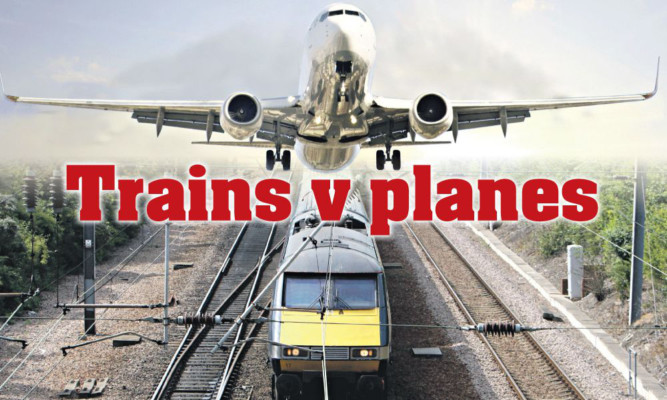
UK Rail fares most expensive in Europe.
Sky-rocketing train ticket prices mean it’s often more expensive to travel by rail than plane, a Sunday Post probe has uncovered.
In some cases passengers can pay three times as much to go by rail and take up to three times as long.
We found flying was cheaper nine times out of 10 when booking at short notice even when factoring in travelling from the airport into city centres.
When booking in advance our probe uncovered it was more expensive to travel by rail eight times out of 10.
Campaigners have reacted with fury to the revelations. They come only five days before rail fares are set to rise by another 2.2%, which again outstrips the average annual pay rise for most workers.
Bruce Williamson, of campaign group Railfuture, blames a chronic lack of investment in the train network for the rail fares “rip-off”.
He said: “While the Government are now awake to the problem, we are a long way behind. It could take decades to sort out. We have the most expensive fares in Europe.”
For our investigation we compared prices for return travel around the UK on two separate weekends, one in the next fortnight and one almost three months away, on 10 popular routes.
The first dates we looked at were for return journeys between January 9 and 12. On all but one of the routes, flying was the cheaper option.
Inverness to London came in at £161 return on the train, but just £45 flying to Luton Airport with EasyJet, which also offers a budget transfer into the centre of London.
On the same dates commuters could expect to pay £90 using the Virgin Rail service from Glasgow to London Euston, with Ryan Air offering fares a third cheaper into Stansted again where budget deals into the city are on offer.
The only cheaper rail deal we found on a short-term purchase came between Manchester and London, where Virgin Rail undercut Virgin’s air service.
Buying in advance, for return journeys between March 13 and 16, the train companies fared a little better, managing to offer a better deal on four of the 10 trips.
However, many cheap rail deals only go on offer 12 weeks in advance of travel meaning travellers can often pay more if they book too far in advance.
Virgin Rail offered £40 deals between Glasgow and London, and rail commuters could expect to save a few pounds between Glasgow and Birmingham. However, flying was by far the cheaper option travelling to London from Aberdeen and Inverness.
Following last month’s price hike announcement, Mick Cash, of the RMT transport union, accused train firms of hitting those at the sharp end of the austerity clampdown the hardest.
Bruce Williamson added: “Even when the Chancellor goes with retail price index as the basis for the fare increase, it’s still the higher measure of inflation. In real terms it’s getting more expensive by rail. And with the recent decline in oil prices, airlines are laughing all the way to the bank. From an environmental point of view, we should be encouraging more people to travel by train, rather than by air.”
Rail commuters are being urged to snap up season tickets before the increase comes into effect on Friday. Train operators defended their pricing structure, pointing out airlines charged for large baggage. They also said train travellers could typically save a third off fares if they obtained a rail card.
A spokesman for East Coast rail said: “Research has shown our trains delivered a cheaper alternative to flying in four out of five comparable cases. This involved trains arriving into London within an hour of the comparable flight’s scheduled time.
“The train offers city centre to city centre travel, wi-fi and no airport transfers or luggage check-ins not to mention the views on one of Britain’s most scenic long-distance rail routes.
“Our trains continue to gain market share on the routes where we compete with airlines, including between Edinburgh or Newcastle and London.”
The Rail Delivery Group, which represents the industry, defended the service on offer to travellers and the cost they’re expected to fork out.
Set up to promote co-operation between train operators and Network Rail, the group welcomed the Government’s announcement to increase regulated fares in September, claiming it represented an average real-terms freeze.
It also said Britain had the most commercially aggressive fares in Europe, with the highest fares designed to get maximum revenue from business travel, and some low fares designed to get more revenue by filling more seats.
A spokesperson said: “Discounting has contributed to the number of train journeys doubling since the mid-90s. In 2012-13, almost half of passenger revenue came from discounted tickets, up from a third in 2003.”

Enjoy the convenience of having The Sunday Post delivered as a digital ePaper straight to your smartphone, tablet or computer.
Subscribe for only £5.49 a month and enjoy all the benefits of the printed paper as a digital replica.
Subscribe